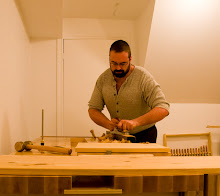What is a hand tool, really? What distinguishes a hand tool from a non-hand-tool? We would all agree that a simple chisel or gouge is a hand tool. No worries, there. After that, it starts to get a bit... foggy.
I've been feeling guilty about my electric lathe. It somewhat offends my hand tool ideals. Maybe I should have a foot-powered pole-lathe. That would be a hand tool, right? Or would it? A lathe is a machine. It turns the workpiece so that you can use gouges and chisels (hand tools) to act upon it. So a foot-powered pole-lathe is a body-powered machine, as opposed to an electric machine, but it's still a machine and not a hand tool. In that respect any lathe 'should' offend my hand tool ideals.
I'm safe with the rest of my tools though, right? Hand saws, chisels, mallets, drawknife, spokeshaves... spokeshaves? Yes, spokeshaves are alright, as are hand planes, because although they do the holding of the cutting tool for you, they don't move the cutting tool or workpiece on their own. They're not a machine in that respect. What about an egg-beater drill? Well, an egg-beater drill is a machine. It's a hand-powered machine, but in the purest sense of the word an egg-beater drill is no more a hand-tool than a cordless drill is. I, however, feel that an egg-beater drill is much closer to my hand tool ideals than the cordless drill, so obviously I must not follow the purest sense of the term 'hand tool'.
Is it just about the electricity? Is that all it is? If I had a table-saw, planer, band-saw, and all manner of wood-working machinery in a line-shaft-driven shop with a few shetland ponies driving it, would that be a 'hand tool shop'? Obviously not, and yet there would be no electricity.
It's must be the mechanization. The fact that the force of work comes from an agency other than the body of the worker (or at least a human helper). So a great-wheel lathe doesn't greatly offend my ideals, even though the turner isn't powering it (the helper is) but a pole-lathe would be closer to my ideals, because the turner powers the lathe directly. Even closer to my ideals would be a drawknife and shaving horse - bypassing the lathe entirely. What if somebody hooked up a recumbent bicycle to a small lathe such that they can sit and pedal and turn pens or whatever? That would be cool, but is it less of a 'hand tool' than a pole lathe? Is it just the antiquity of the idea that lends respectability to a tool? So are my cutting-edge (har!) Veritas planes less of a hand tool than an old woodie?
These are tricky questions to answer, but the process might be worthwhile.
Sunday, May 24, 2009
Subscribe to:
Post Comments (Atom)

5 comments:
Dude, you need a woman ASAP.
Thank you for that enlightened commentary. :)
Luckily, for me at least, having a woman in my life doesn't stop me from thinking.
M.Mike
Interesting topic Mike. Along those lines, could a jigsaw be considered a hand tool? I mean a motor moves the blade but the hand still guides the cut.
I personally tend to try to not worry about the semantics of it all and just use the method I enjoy using the most. For me that means completely human powered ('cept for the lights of course), for someone else it may mean a combination of 'lectric and alcohol powered. In the end, it's all about what you enjoy the most. That's what makes this hobby so great. Everyone can do it their own way. There is no single right way.
An excellent point, Bob. I should leave the semantics alone and get back to actually using the tools. :)
M.Mike
I agree with Bob on this one. It's really just semantics. As long as you're enjoying using the tool, I feel like you can't go wrong.
Post a Comment